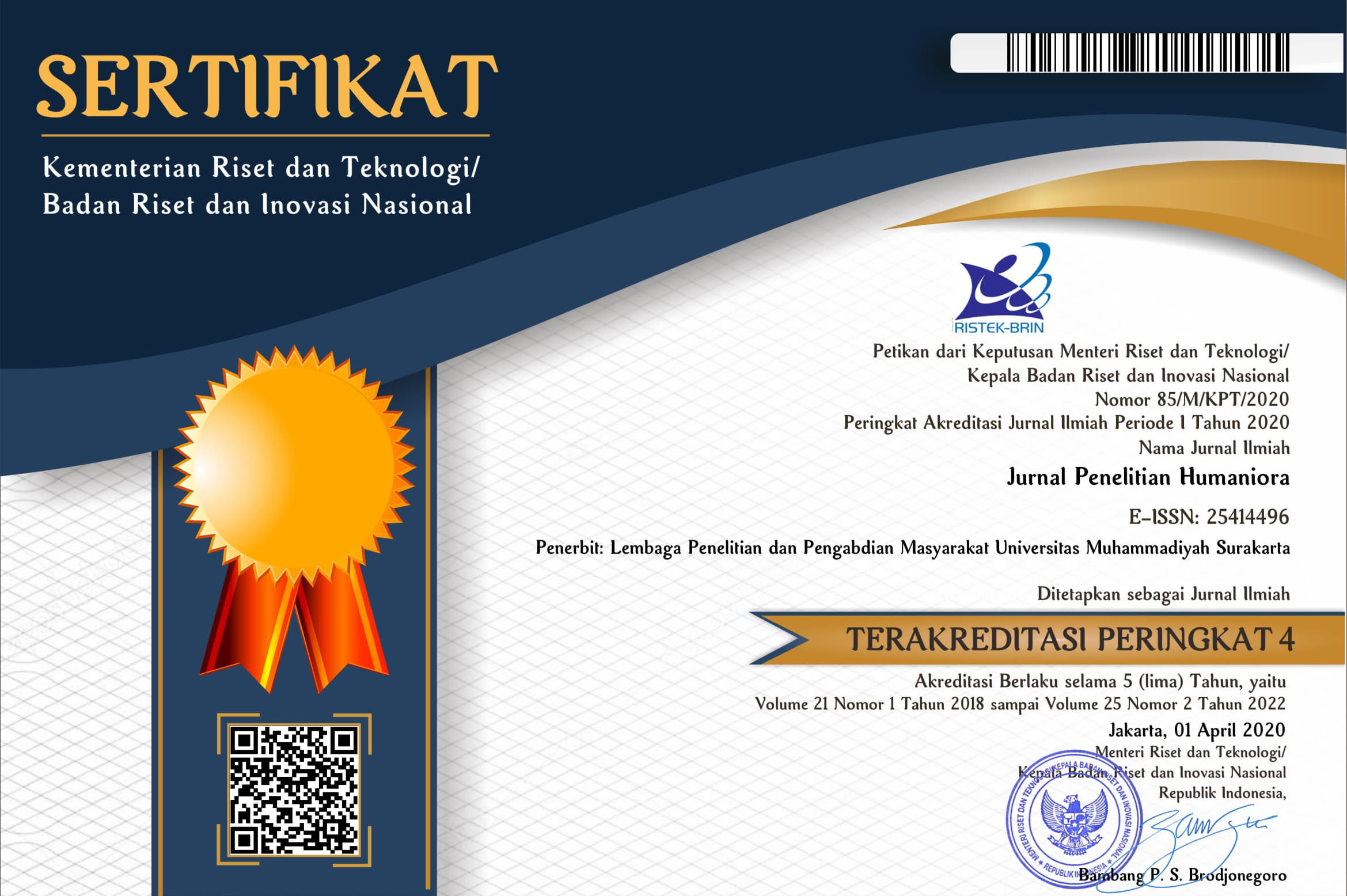HUBUNGAN SELF EFFICACY DAN POLA ASUH OTORITER DENGAN PROKRASTINASI AKADEMIK PADA MAHASISWA
Rohmatun Rohmatun(1*), Taufik Taufik(2)(1) Universitas Muhammadiyah Surakarta
(2) Universitas Muhammadiyah Surakarta
(*) Corresponding Author
Abstract
This research is aimed at investigating the correlation between selfefficacy and authoritarian parenting style toward student s’ academic procrastination. The subject of this research is 150 students of faculty of of Psychology, Medicine, and Economy of Sultan Agung Islamic University who are working on the final project. The major hypothesis proposed in the research is that there is a correlation between self-efficacy and authoritarian parenting style with students’ academic procrastination. The minor hypotheses are as follows: (1) there is a negative correlation between self-efficacy with academic procrastination; and (2) there is a positive correlation between authoritarian parenting style with academic procrastination. This research used three of scale for the data collection namely academic procrastination scale, self-efficacy scale and authoritarian parenting stale scale. The statistic analysis used in the research is regression to test major hypothesis and the parsial analysis to test minor hypothesis. The research results show that (1) there is correlation between self-efficacy and authoritarian pareting style with students’ academic procrastination; (2) there is a significant negative correla tion between self-efficacy with academic procrastination toward college students; and (3) there is a significant positive correlation between authoritarian parenting style with academic procrastination toward college sudents.
Keywords
Full Text:
PDFReferences
Al-Atiyyah, A. 2010. “Academic Procrastination and its Relation to Motivation and Self-Efficacy: The Case of Qatari Primary Scholl Student”. Academic Journal. International Journal of Learning,17(8).
Bandura, A.1997. Self Efficacy: The Exercize Of Control, New York: W.H. Freeman and Company.
Djing. S. T. 2006. “Penyusunan dan Pengujian Model Prokrastinasi Akademik”. Tugas Akhir Mata Kuliah Model Persamaan Struktural (Structural Equation Model) (Tidak Diterbitkan) Program Doktor Psikologi Universitas Gajah Mada. Yogyakarta.
Fara. 2002. “Menunda Pekerjaan. Gangguan Jiwa? Dalam Lisa”. Majalah Mingguan. Jakarta. 28 Januari – 3 Pebruari 2002.
Feist, J. & Feist, G, J. 2010. Teori Kepribadian Theories of Personality, Buku 2 Edisi 7. Alih Bahasa: Smita Prathita Syahputri. Jakarta: Salemba Humanika.
Ferrari, J.R, Johnson, Mc Cown. 1995. Procrastination and Task. Avoidance. Theory, Research and Treatment. New York: Plenum Press.
Iskender, M. 2011. “The Influence of Self-compation on Academic Procrastination and Dysfunctional Attitudes”. Full Lenghth Research Paper”. Educational Research and Reviews, 6(2) 230 – 234.
Jackson, D, M, H. 2010. “Role of Academic Procrastination, Academic Self-efficacy Belief, and Prior Academic Skills on Course Outcomes for College Students in Developmental Education”.
Klassen. R.M; Lindsey. K; Rajani, Sukaina. 2008. “Academic Procrastination of Undergraduates: Low Self-Efficacy to Self-Regulate Predicts Higher Levels of Procrastination”. Contemporary Educational Psychology. 33 4 915 – 931, October 2008.
Lestari, S. 2012. Psikologi Keluarga. Penanaman Nilai dan Penanganan Konflik dalam Keluarga. Jakarta: Kencana.
Meinarno, E. A. 2010. Konsep Dasar Keluarga.Keluarga Indonsia Aspek dan Dinamika Zaman. Penyunting: Silalahi K, Meinarno, E. A. Jakarta: PT Raja Grafindo Persada.
Millgram. 2000. Persepsi Remaja terhadap Penerapan Disiplin Orang Tua dengan Prokrastinasi Akademi (http://www.carleton,ca/~tpychyl /history. html/).
Papalia, D,E,. Old, S.W,. Feldman, R.D,. 2009. Human Development Perkembangan Manusia. Edisi 10 Buku 2. Jakarta. Salemba Humanika.
Pychyl. T.A; Coplan. R.J; Reid. AM.P. 2002. Parenting and Procrastination: Gender Differences in the Relation Between Procrastination, Parenting Style and Self-Worth in Early Adolescence. Personality and Individual Differences 33 (2010) 271 – 285.
Rahmawati, D.A. & Alsa, A. 2011. Hubungan antara Konsep Diri Akademik dan Dukungan Sosial Teman dengan Prokrastinasi Akademik Penulisan Skripsi pada Mahasiswa. Tesis. Yogyakarta. Universitas Gajah Mada. Electronic Thesis and Disertation (ETD). Gajah Mada. Diunduh Tanggal 20 Oktober 2012.
Ritonga, D. A, & Himam, F. 2012. Dinamika Prokrastinasi Mahasiswa dalam Penulisan Skripsi. Tesis. Yogyakarta. Universitas Gajah Mada. Electronic Thesis and Disertation (ETD). Gajah Mada. Diunduh Tanggal 20 Okteober 2012.
Rosario.P.Costa M. Nunes, JK. Pienda,JG. Salono.P. Vall, A. 2009. “Academic Procrastination: Association with personal, School, and Family Variables”. The Spanish Journal of Psychology. 1.2. 1. 118 – 127.
Santrock.J,W. 2009. Psikologi Pendidikan. Educational Psychology. Edisi 3, Buku 2. Alih Bahasa Diana Angelica. Jakarta: Salemba Humanika.
--------. 2011. Masa Perkembangan Anak Children. Buku 2. Edisi 11. Alih bahasa: Verawati Pakpahan, Waahyu Anugraheni. Jakarta: Salemba Humanika.
--------. 2012. Life Span Development Perkembangan Masa Hidup. Jilid 1 Edisi ketiga belas. Alih Bahasa: Benedictine Widya Sinta. Jakarta: Penerbit Erlangga.
Siaputra, I. P. 2012. Akselerasi Penyelesaian Skripsi. Dalam Prawitasari, J.E. Psikologi Terapan Melintas Batas Disiplin Ilmu. Jakarta: Erlangga.
Sugiarto. 2012. “Pengaruh Konsep Diri dan Efikasi Diri terhadap Prokrastinasi Akademik pada Mahasiswa Bimbingan & Konseling”. Tesis Fakultas Ilmu Pendidikan UNY. Eprints.uny.ac.id/6441/1/Abstrak.pdf.
Terry, D,Y. 2004. “Investigating the Relationship between Parenting Styles and Delinquent Behaviour.”MC Nair Scholar Journal.
Article Metrics
Abstract view(s): 2034 time(s)PDF: 1983 time(s)
Refbacks
- There are currently no refbacks.











